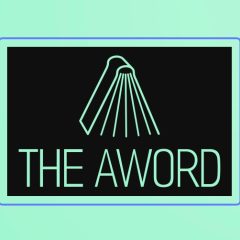Deaf-blindness is defined as having both your hearing and sight impaired.
Deafblind UK helps people who are deafblind to live with their condition and to build their confidence and independence. They offer comfort, understanding and advice as well as practical support, residential support, care and social opportunities.
I can only imagine what that must be like to be Deaf-Blind, so in the interest of educating myself further and hopefully educating some other people I thought I would interview one of my friend Evie about her experience.
I had already learnt a few things from Evie and interviewed her a few times for a school podcast. However, this time I thought we would try and delve deeper into the condition and how it affects people’s day to day living.
Evie is a Judo player who is currently on the GB Paralympic team, she is currently studying sports massage at college as well as working towards her black belt in Judo. She is hoping to get to the Paralympics by 2028. You can find Evie’s judo journey on instagram.

Q: What is the reason you are Deaf-Blind?
A: The doctors diagnosed me with ramos-arroyo syndrome which affects the eyes anaesthetic corneas, optic nerve, hypoplasia and sensorineural deafness. It is a very rare syndrome and has only been reported 5 times since 2008.
Q: When did you or your family start noticing you were Deaf-Blind?
A: I was 4 months old when my family found I had a visual impairment as my eyes got infected. My parents noticed I wasn’t hearing things properly as I was a very active child but I wasn’t talking the way other children did, which is when my family found out I was going deaf.

At 4 I started using hearing aids which I really didn’t like as I didn’t understand why I had to wear them. But after a while I started to get used to them and started to like them more.
Q: What has your Deaf-Blind journey been like?
A: My hearing and vision has always been deteriorating little by little but when I was 16 I made the decision to go to a blind sixth form to improve my skills.

This is where my deterioration really started as I was losing more and more vision and hearing. I had been offered cochlear implants a few times before but I had turned it down as I didn’t want it to affect my judo journey. But I then found out that it wouldn’t affect my judo. This made me very happy as Judo is my life.


Last August I had my cochlear implant operation and was ‘turned on’ only two weeks after that. It was shocking my first thought was wow. But it wasn’t able to instantly hear everything as I had to re-learn how to hear everything. It is a very long process and even now I am still learning sounds both old and new.
I am now starting to get back to my judo training and I met this lovely lady who was also deaf with cochlear implants. She had done judo competitively and showed my how to take care of my implants in training and competitions.

Q: What did you do whilst growing up to help you develop different skills and have different experience?
A: I did a lot of different activities as a kid to help me develop different skills and have different experiences. I did Ballet, swimming, rock climbing, going away with the deaf community and judo which is what most people know me for.




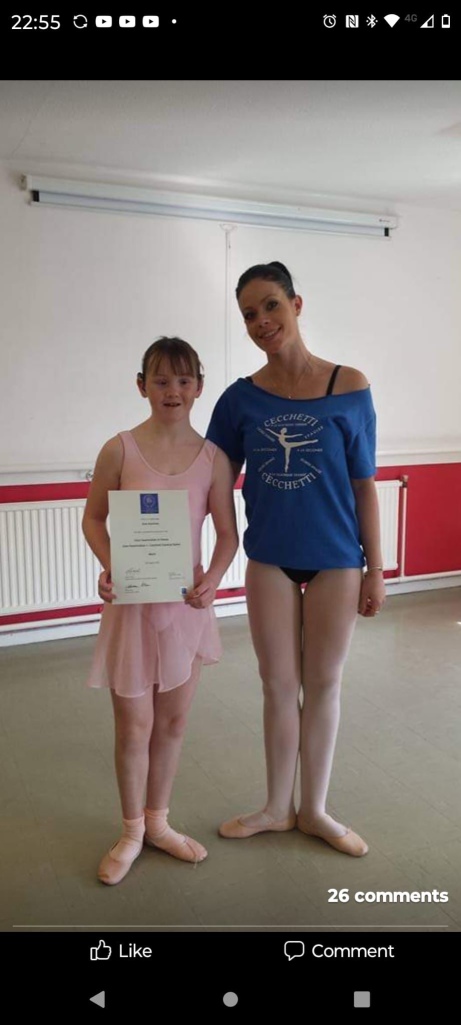





I also went away with the deaf community. I was part of this amazing community with young people who also have some sort hearing impairments or deafness. They set up holidays for us to learn different skills and help us build confidence and grow as people together. We did all kinds of different activities such as; hiking, sports, games, arts and craft, boat sailing, speed boat riding, archery, building campfires and dens. But most importantly making friends and learning about each other and how we could help one another. These events helped to improve my confidence and all of the different skills I had as well as teaching me new ones.
Q: How do you do tasks independently if you are deaf-blind?
A: I can do anything that anyone else can I just have to adapt everything to suit me.

When I am out I currently use a long white cane which has red stripes on which lets people know I am deaf as well as blind.

When I travel on the train I book assistance to help guiding me on and off the train and finding a seat. I use the Trainline app to track my journey so I know which stop is next as I can’t hear the announcements. On buses I use the moveit app which means I can track my stops.

I have been learning different routes with my mobility instructor to help me get confident navigating to my regular places such as the shops or the train station. When crossing the road I try find tactile payments or a quiet spot. I use pelican crossing so i can rely on the spinning cone to know when it safe to cross as I can’t hear the beeping sound. Crossing a road is very difficult if people block the pelican crossing as it means i then can’t find the spinning cone.
I can live independently by having adapted equipment like a one cup kettle, using an electric hob instead of gas, having a doorbell system, vibrating fire alarm, Braille labelled medication and different technologies.
There are so many adaptations to equipment out there now for all disabled people to live independently as much as possible.
Q: Will you be getting an assistance dog?
A: Yes I am planning on getting a guide dog. I’m currently in the process of getting one to help me travel around independently and safely. Because of my Deafness the dog would hopefully be trained to alert me when a fire alarm is going off and alert to door knocking as well as being able to guide me.
I have previously had a buddy dog. Buddy dogs are a service run by Guide dogs which is aimed to help give children more confidence, build relationships and help gain trust. Buddy dogs can also help with wellbeing and family too.

My parents decided to get me a buddy dog when I was 10 because they knew it would give me more independence, help me become responsible and prepare me for getting a guide dog.
I was one of the first few people to get a buddy dog as the scheme was very new. My buddy dog is called Uma and she has been there for me from the toughest days to the best days. Una has helped me build confidence, get outside, meet new people and learn new skills. She has come everywhere with me from libraries to beaches, on holiday, on planes and on trains. Anywhere you can think if Uma has probably been there with me.
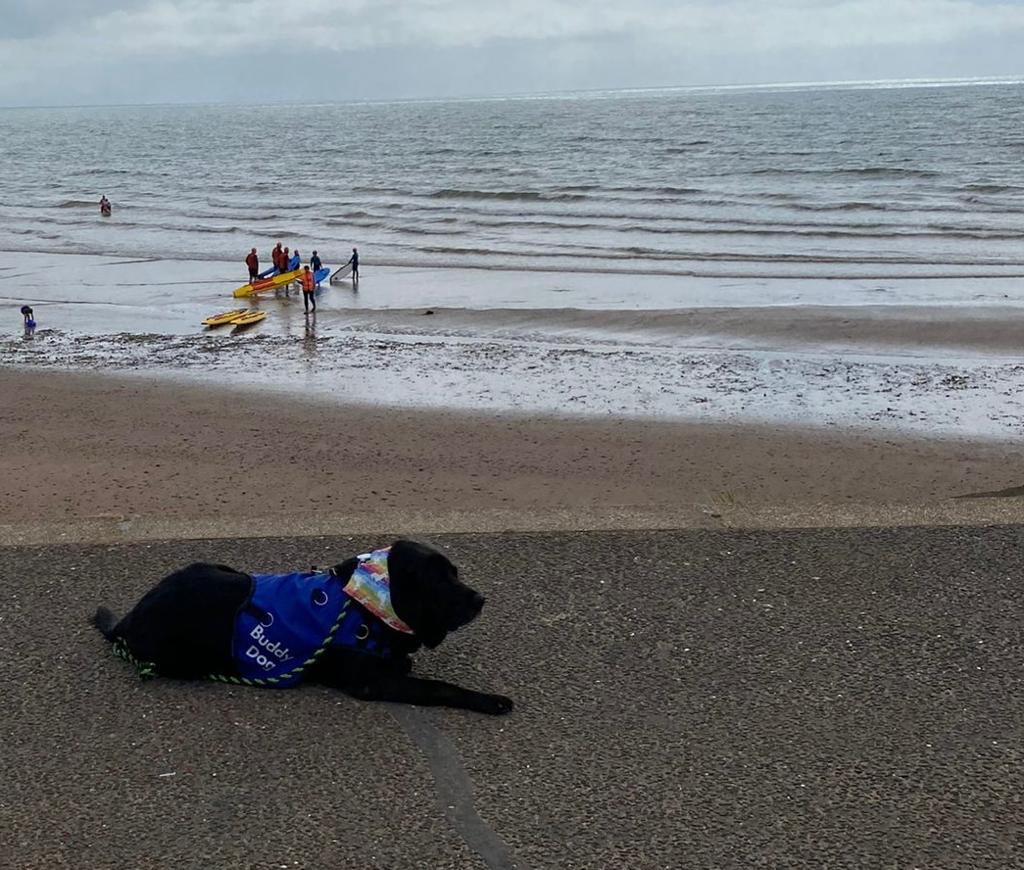
Me and Uma meet up and filmed an advert for guide dogs a few years ago to raise more awareness for the buddy dog scheme. The advert can be found on YouTube and shows the kind of relationship me and Uma have.




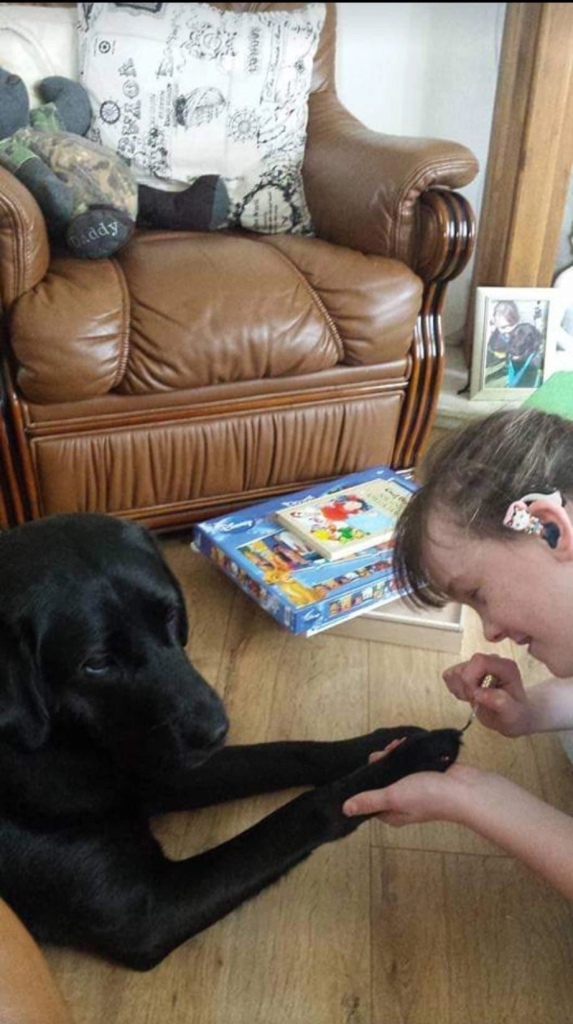

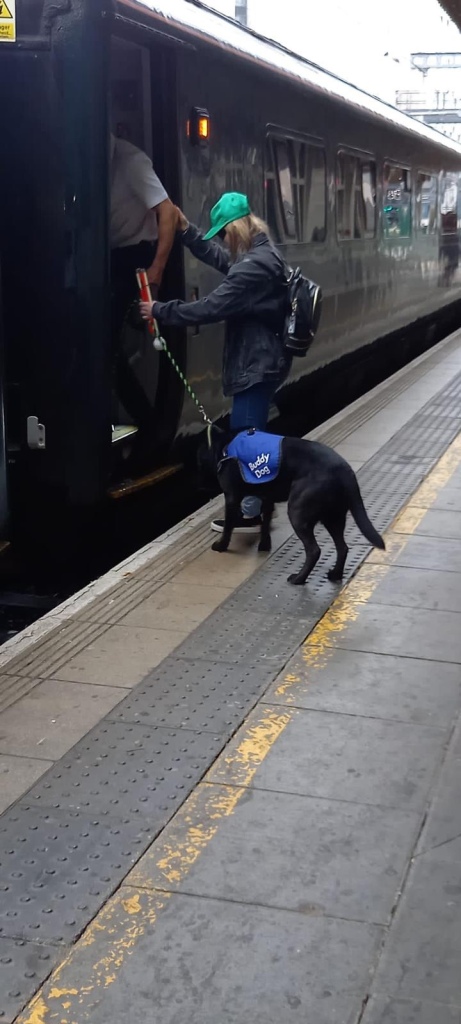
Uma is my best friend. She has helped me through so much and she probably doesn’t even know how much she has helped me.
Q: How do you do Judo if you are deaf-blind?
A: Like I said earlier I have done a lot of sports over the years, I have been doing Judo for 7 years now and I am currently a brown belt. I compete in high level Judo competitions and I am also on the paralipomena pathway for visually impaired Judo fighters. I have done really amazing judoka coaches and fighters.

I communicate with my coaches so they know the best way of supporting me. I learn by feeling the technique and positioning that is being taught as when i am fighting i take my cochlear implant out. This is the same when I compete in competition as i am guided by the referee and I then ‘grip up’ with my competitor. When I compete the referee will tap me once and to stop the fight they tap me twice. The score is then signed on to my hand before I am guided back off the mats.
Q: What are you hoping to do when you leave college?
A: When I leave college I am hoping to s carry on with my competitive Judo training and start training full time. Which would hopefully mean i get to travel internationally with the VI Great British team. If that doesn’t work out or when I finish my judo career I am hoping to tart up my own massage business and become self-employed.
Q: What do you struggle with about being deaf-blind?
A: I struggle a lot with communication; as I can’t always hear people’s voices especially if they are higher in pitch, I can’t read lips because of my Blindness and I have to use hands on hands signing which not a lot of people know.
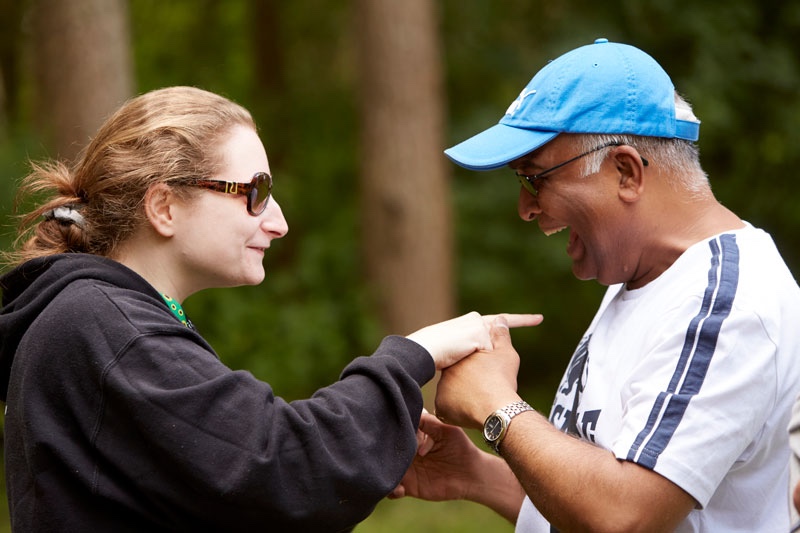
Q: Can you explain how you learnt hands on hands signing?
A: I started learning sign language when I was very young. When I started I still had some useful vision, because I still had useful vision when I just learnt normal sign language as I could see sign close up.
I did stop learning for a few years and by the time i took sign language back up I had lost more hearing and aight. This meant that I had to re-learn sign language but adapt it to deaf-blind sign language or as it is more commonly known hands on hands signing. I started learning hands on hands signing when I was in secondary school; I would have a support teacher come in and teach me how to communicate in an accessible way by allowing me to feel the signs by holding their hands.
Q: How might someone learn hands on hands signing?
There is a deaf-blind sign language course you can take which you can find on the internet by different companies such as signature and sign for thought. Although the best way to learn hands on hands Sign Language is from a deaf-blind person as they know best what works for them deaf-blind people are happy to help so just feel free to ask us.
Q: Do you prefer cochlear implants to hearing aids?
A: Yes I do prefer having cochlear implants over my hearing aids; because it’s better technology and has improved my hearing a bit more. It is just lot easier now communication wise. There is nothing that doctors can do to help my vision; so at least they can help by bringing some of my hearing back to make my day to day life easier.
Q: What is some advice you want to give someone who is considered cochlear implant surgery?
A: Don’t be afraid to stand out wearing them, be proud. Ask lots of questions before the surgery and consider all the pros and cons as there us no turning back. If it is possible try and speak with other cochlear implant users before making a decision.
Q: Would you recommend cochlear implants to someone else?
A: I would definitely recommend them, i find that they really do make a difference.
Q: What are some sounds you can now hear that you love?
A: The sounds that I have really been enjoying recently (because of the very hot weather) is thunderstorms because I’ve never been able to hear them before it has been an entirely new experience. I have also really been enjoy the sound of the birds singing when I go out for a walk as again I have never been able to hear these before.
Q: What are some sounds you don’t like?
A: The sound I really don’t like hearing now is the sound of small dogs barking as it is a very high pitched bark.
Q: What are some myths you want to debunk about deaf-blindness?
A: The top things that I want people to understand about Deaf-blindness are:
Deaf- blind is a spectrum not all deaf-blind people have the same level of hearing or sight. So in my case I’m perfoundly deaf wearing two cochlear implants and I don’t have any useful vision anymore. I’m completely blind in one eye and in the other I can see a very little amount of certain colour and light reflected
Not all deaf-blind people know sign language, I sometimes use tactile BSL it’s slightly different to normal sign language; but it’s basically the same only someone does it hands on hands with me.
Deaf-blind people can use phones and technology. Everyone is different regarding how they use them for example a brallie display connect to a phone or people with hearing devices would use voiceover which they can access over Bluetooth. I can use both ways
Q: What is the best thing about being deaf-blind?
A: The best thing is being able to take my implants out and have a break from hearing.
Q: If you could tell your younger self something what would it be?
A: You’re going to face a lot of defeat but you will get through it.
Q: Would you want to change yourself so you weren’t disabled?
A: This is a very sensitive subject for some people as everyone has different views. For me because I never really knew the world being able to see and hear . I’ve always had to adjust to the world and I’ve learned skills to be able to live in this world. As much I do sometimes struggle it’s does not stop me. I wouldn’t change my disability for anything because it’s not who I am but it a part of me.
Q: What is something you would like to see changed to make society more accessible for you?
A: Make all shop and restaurants staff more knowledgeable and have some basic information and safeguarding put in these places to help deaf -blind people. Things like braille or large print menus, offer sighted guiding around and even offer a quieter table to sit at. Just some basic accessibility things to help more disabled people,
Q: What would you like to come of deaf-blind awareness week?
A: I would love more representation of Deaf-blind people to share their own experiences
to help people understand a person who is deaf-blind. I also hope that people will learn not to presume we can hear because we have implants and see because we know the way.
Anything is possible. Just because you can’t hear or see it doesn’t mean we don’t understand. With support, equipment and technology anything is possible to achieve.
There are lots of different communities you can join to learn more about Deaf-Blindness.
If you are interested in finding out more about Dead-Blindness you can find content creators such as:
Molly Watts works in the fashion and beauty industry and has usher syndrome. You can find Molly on TikTok and instagram.
Marlene is a Deaf-Blind traveller who tackles challenges she faces in society. You can find Marlene on instagram, YouTube and on her blog.
You can also watch documentary about being deaf blind on YouTube here and here.
